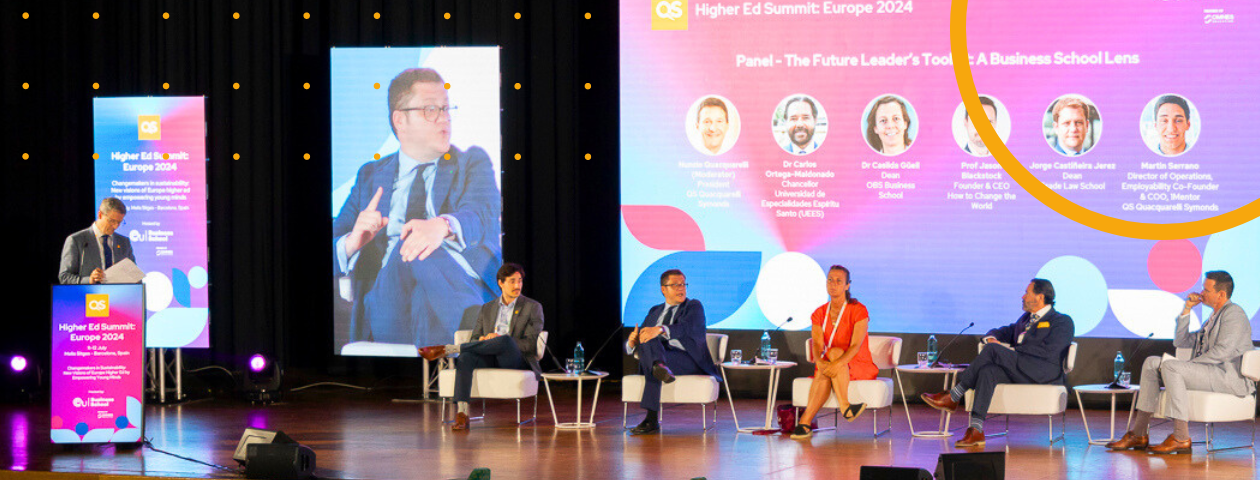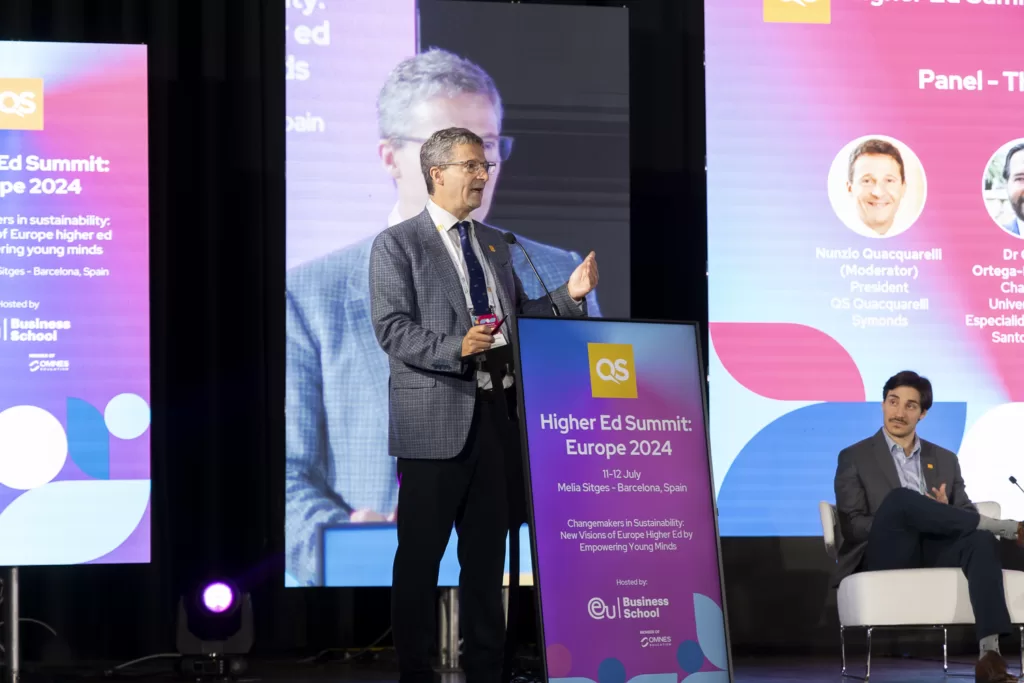
Today’s purpose-driven students are primed for change. Growing into adulthood at a time of rapid tech advancements and globalisation, prospective students have the mindset the world needs in its future changemakers.
That’s according to Dr Laura Carnicero, Executive Vice-President for People and Organisation at SEAT, a Spanish car manufacturer. Dr Carnicero believes that young people are the heartbeat of our industries and the promise of our future. Speaking at the QS Higher Ed Summit: Europe 2024, Dr Carnicero said: “These young changemakers possess a unique perspective, and an attitude of adaptability and resilience. It’s our responsibility to foster that and empower young minds to address challenges of the present and the future.”
For José Milano, Executive Chairman at OMNES Education Group, higher education is key to the growth of society and providing multiple interdisciplinary responses to the world’s major societal and economic challenges.
He said: “If our youth are to continue to build a stronger model for the future, one that is more supportive and responsive, we must make them our priority. Our young people are ready to take on the challenges we face, as long as we trust them and give them the knowledge and skills to build a better way of living.”
To empower motivated people across the globe to fulfil their potential, educators must nurture students with a full and dynamic toolkit that can prepare them to not only be resilient to change, but to make it.
Building the future changemaker’s toolkit
As we witness what has been coined the fifth industrial revolution, the demand for human skills is becoming ever greater as the demand for sustainability skills becomes more prevalent. The workplace requires a complete reset in the way higher education prepares its students, according to Nunzio Quacquarelli, QS Founder and President.
Nunzio said: “There is a fundamental mismatch between the needs of global enterprise and the output of higher education. Historically, education has prioritised delivering and imparting knowledge founded on impactful research, but in the future higher education must focus more on delivering knowledge plus skills and supporting students to articulate the skills they’ve developed in their portfolio.”

Alongside technical skills, priority should be given to lifelong learning and the skills to remain resilient and agile in navigating a rapidly changing landscape. While digital literacy is important, so too are the skills to question and interrogate AI tools for the most authentic and valuable outcomes.
Martín Serrano, QS Director of Employability and Co-founder of 1Mentor, predicts that one of the key skills for the future changemaker’s toolkit is lifelong learning. Martín said: “In the next few years, and throughout students’ lives, the skills we need are going to change very quickly because industry is evolving at a rapid pace. Leaders are going to have to adapt to stay up to date with these changes, but also to be able to disseminate their learning to people across their organisation.”
The necessary rise of experiential learning
Work experience and internships have long been an incentive for students choosing a degree based on their career goals, but the necessity of gaining experiential learning is increasing as students’ ability to put the knowledge and skills learned in the classroom into practice becomes essential to employers.
Jason Blackstock is Founder and CEO of How to Change the World, a social enterprise which provides experiences for higher education leaders, educators and students to help transform careers for a sustainable future.
Speaking at the QS Higher Ed Summit: Europe 2024, Jason said: “Universities no longer have a monopoly on knowledge. Knowledge is now available widely via online content and AI tools. The most important skill that we need to provide students with today is not just how to understand but how to apply knowledge to wicked, messy real-world problems.”
He added: “We need innovation, creativity, resilience and problem solving, and they can only be learned through real-world experiential learning. The world is a lab right now and we have to prepare people to go into it with the mindset to keep experimenting as we go.”
Fostering an interdisciplinary mindset
“There is not a single challenge today that is mono-disciplinary,” Jason said. “They are all highly intercultural, interdisciplinary and we cannot be the expert in everything.”
Universities can nurture an interdisciplinary mindset in their students by ensuring that teamwork goes beyond group work in the classroom and incorporates learning from across different subjects, and opportunities within industry.
Muriel Cordier, CSR Group Director at OMNES Education Group, believes that if higher education does not work smarter in developing critical thinking, citizenship and collaboration, “the sector risks falling into a world without the tolerance, openness and teamwork needed to tackle systemic challenges.”
Interdisciplinary learning was a key theme across the QS Higher Ed Summit: Europe 2024, as many higher education leaders spoke about the importance of interconnectedness in the face of complex multidisciplinary challenges and providing students with the internships and work experiences to understand how teamwork plays a key role in problem solving.
Martín said: “Work experience and internship opportunities are often the first time that students realise the interdisciplinary nature of work. A student from a finance background suddenly sees they have to work closely with the marketing team or the HR team, and so providing experiences for students to practise interdisciplinary working takes down those barriers of learning.”
Universities at the forefront of setting ambitious goals for the future
As centres for knowledge, universities should be positioned to set ambitious goals for their countries and regions, setting a precedent for policymakers to pay attention and make the changes that are needed to tackle and progress the world’s biggest challenges and contribute to improvements in society and the economy.
As drivers for change, rather than reactionaries, higher education institutions can pioneer progress to inspire and influence policymakers, businesses and the public to adopt more progressive and forward-thinking approaches.
As changemakers themselves, universities are perfectly placed to prepare students for the future, by embedding innovation and ambition into their operations and culture and therefore equipping students with the knowledge, skills, and experiences necessary to drive positive change in their communities and beyond.



